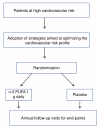Efficacy of n-3 polyunsaturated fatty acids and feasibility of optimizing preventive strategies in patients at high cardiovascular risk: rationale, design and baseline characteristics of the Rischio and Prevenzione study, a large randomised trial in general practice
- PMID: 20509875
- PMCID: PMC2909229
- DOI: 10.1186/1745-6215-11-68
Efficacy of n-3 polyunsaturated fatty acids and feasibility of optimizing preventive strategies in patients at high cardiovascular risk: rationale, design and baseline characteristics of the Rischio and Prevenzione study, a large randomised trial in general practice
Abstract
Background: The optimization of preventive strategies in patients at high risk of cardiovascular events and the evaluation of bottlenecks and limitations of transferring current guidelines to the real world of clinical practice are important limiting steps to cardiovascular prevention. Treatment with n-3 polyunsaturated fatty acids improves prognosis after myocardial infarction, but evidence of this benefit is lacking in patients at high cardiovascular risk, but without a history of myocardial infarction.
Methods/design: Patients were eligible if their general practitioner (GP) considered them at high cardiovascular risk because of a cardiovascular disease other than myocardial infarction, or multiple risk factors (at least four major risk factors in non-diabetic patients and one in diabetics).Patients were randomly allocated to treatment with n-3 polyunsaturated fatty acids (1 g daily) or placebo in a double-blind study and followed up for five years by their GPs to assess the efficacy of the treatment in preventing cardiovascular mortality (including sudden death) and hospitalization for cardiovascular reasons. The secondary, epidemiological, aim of the study is to assess whether it is feasible to adopt current guidelines in everyday clinical practice, with a view to optimizing all the available preventive strategies in people at high cardiovascular risk.A nation-wide network of 860 GPs admitted 12,513 patients to the study between February 2004 and March 2007. The mean age was 64 years and 62% were males. Diabetes mellitus plus one or more cardiovascular risk factors was the main inclusion criterion (47%). About 30% of patients were included because of a history of atherosclerotic cardiovascular disease, 21% for four or more risk factors, and less than 1% for other reasons.
Discussion: The Rischio and Prevenzione (R&P) project provides a feasible model to test the efficacy of n-3 polyunsaturated fatty acid therapy in patients at high cardiovascular risk with no history of myocardial infarction, and to assess how to implement recommended preventive strategies in general practice.
Trial registration: ClinicalTrials.gov NCT00317707.
Figures


References
-
- Sans S, Kesteloot H, Kromhout D. The burden of cardiovascular diseases mortality in Europe. Task Force of the European Society of Cardiology on Cardiovascular Mortality and Morbidity Statistics in Europe. Eur Heart J. 1997;18:1231–1248. - PubMed
-
- Tunstall-Pedoe H, Kuulasmaa K, Mahonen M, Tolonen H, Ruokokoski E, Amouyel P. Contribution of trends in survival and coronary-event rates to changes in coronary heart disease mortality: 10-year results from 37 WHO MONICA project populations. Monitoring trends and determinants in cardiovascular disease. Lancet. 1999;353:1547–1557. doi: 10.1016/S0140-6736(99)04021-0. - DOI - PubMed
-
- De Backer G, Ambrosioni E, Borch-Johnsen K, Brotons C, Cifkova R, Dallongeville J, Ebrahim S, Faergeman O, Graham I, Mancia G, Manger Cats V, Orth-Gomer K, Perk J, Pyorala K, Rodicio JL, Sans S, Sansoy V, Sechtem U, Silber S, Thomsen T, Wood D. European guidelines on cardiovascular disease prevention in clinical practice. Third Joint Task Force of European and Other Societies on Cardiovascular Disease Prevention in Clinical Practice. Eur Heart J. 2003;24:1601–1610. doi: 10.1016/S0195-668X(03)00347-6. - DOI - PubMed
Publication types
MeSH terms
Substances
Associated data
LinkOut - more resources
Full Text Sources
Medical

